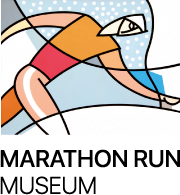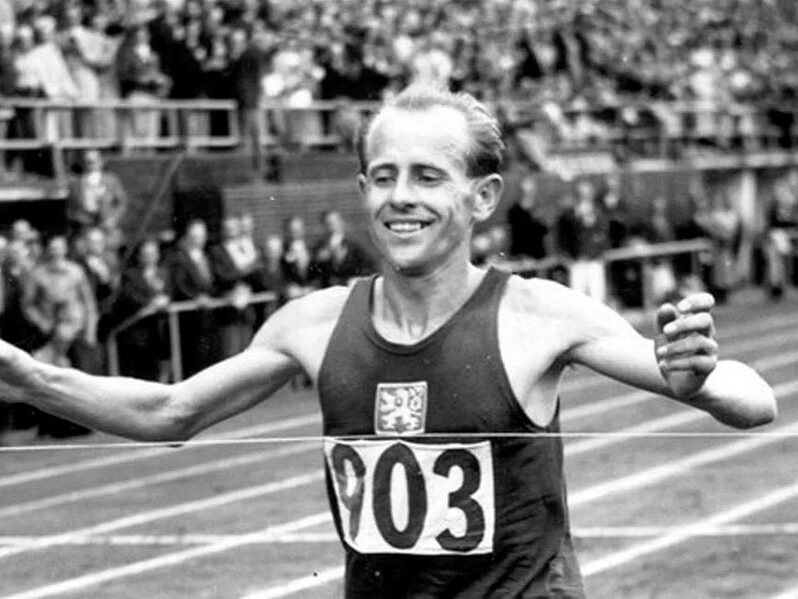Emil Zátopek (19 September 1922 – 21 November 2000) was a Czech long-distance runner best known for winning three gold medals at the 1952 Summer Olympics in Helsinki. He won gold in the 5,000 metres and 10,000 metres runs, but his final medal came when he decided at the last minute to compete in the first marathon of his life. He was nicknamed the “Czech Locomotive”.
In 1954, Zátopek was the first runner to break the 29-minute barrier in the 10,000 metres. Three years earlier in 1951, he had broken the hour for running 20 km. He was considered one of the greatest runners of the 20th century and was also known for his brutally tough training methods. He popularised interval training after World War Two.
In February 2013, the editors at Runner’s World Magazine selected him as the Greatest Runner of All Time. He is the only person to win the 5,000 metres (24 July 1952), 10,000 metres (20 July 1952) and Marathon (27 July 1952), in the same Olympic Games.
Zátopek was born as the seventh child into a family of modest means. Aged 16, he began working at the Bata shoe factory in Zlín. Zátopek recalled that “One day, the factory sports coach, who was very strict, pointed at four boys, including me, and ordered us to run in a race. I protested that I was weak and not fit to run, but the coach sent me for a physical examination, and the doctor said that I was perfectly well. So I had to run, and when I got started, I felt I wanted to win. But I only came in second. That was the way it started.” Zátopek finished second in a field of 100. After that, he took up a serious interest in running. He joined a local athletic club where he developed his own training program modeled on what he had read about the great Finnish Olympian Paavo Nurmi.
A mere four years later, in 1944, Zátopek broke the Czechoslovak records for 2,000, 3,000 and 5,000 metres. At the end of the war he joined the Czechoslovak Army, where he was gradually given more time for his gruelling training regimen.
Zátopek was selected for the Czechoslovak national team for the 1946 European Championships in Oslo and finished fifth in the 5,000 m in 14:25.8, breaking his own Czechoslovak record of 14:50.2. At the 1948 Summer Olympics in London, Zátopek won the 10,000 m and finished second behind Gaston Reiff from Belgium during a driving rainstorm in the 5,000 m.
The following year, Zátopek broke the 10,000 m world record twice, and went on to better his own record three times over the next four seasons. He also set records in the 5,000 m (1954), 20,000 m (twice in 1951), one-hour run (twice in 1951), 25,000 m (1952 and 1955), and 30,000 m (1952). He won the 5,000 m and 10,000 m at the 1950 European Championships and the 10,000 m at the next European Championships, ahead of Jozsef Kovacs and Frank Sando.
At the 1952 Summer Olympics in Helsinki, Zátopek won gold in the 5,000 m, 10,000 m, and the marathon, breaking Olympic records in each event. Zátopek is the only person to win these three long-distance events in the same Olympic games. His victory in the 5,000 m came after a ferocious last lap in 57.5 seconds, during which he went from fourth place to first in the final turn, passing first Alain Mimoun of France, then Herbert Schade of West Germany, and finally Chris Chataway of Great Britain. Zátopek’s final medal came when he decided at the last minute to compete in the marathon for the first time in his life, and won. His strategy for the marathon was simple: he raced alongside Jim Peters, the British world-record holder. After a punishing first fifteen kilometres, in which Peters knew he had overtaxed himself, Zátopek asked the Englishman what he thought of the race thus far. The astonished Peters told the Czech that the pace was “too slow,” in an attempt to slip up Zátopek, at which point Zátopek simply accelerated. Peters did not finish, while Zátopek won the race and set an Olympic record. Zátopek running in his first Marathon, beat second placed Reinaldo Gorno (Argentina) by 2:01 minutes.
Source: wikipedia


